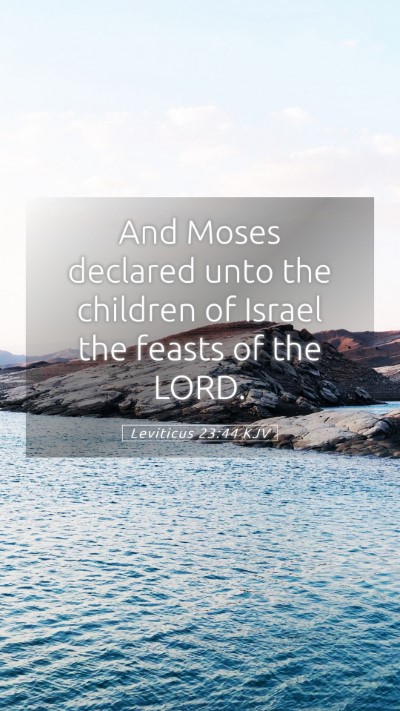Leviticus 23:44 - Understanding the Verse
Leviticus 23:44 states, "And Moses declared to the children of Israel the feasts of the Lord." This verse serves as a conclusion to the various instructions regarding the appointed feasts of God, emphasizing the importance of these sacred days for the Israelite community.
Overview of the Verse
This section draws from insights provided in various public domain commentaries. Leviticus 23:44 illustrates Moses’ role as a mediator, relaying the divine ordinances concerning the religious observances of Israel.
Key Themes and Insights
-
The Role of Moses:
Moses’ announcement of the feasts highlights his essential function as the leader and prophet of Israel. According to Matthew Henry, this passage shows that Moses was committed to ensuring that the people understood and observed God's commands.
-
The Importance of Feasts:
The feasts are not merely commemorative; they serve as vital occasions for worship and community. Albert Barnes elaborates that these appointed feasts were reminders of God's provision and purpose in their history.
-
Community and Worship:
Adam Clarke emphasizes that the feasts also fostered a sense of unity among the tribes of Israel, reinforcing their collective identity as God's chosen people.
-
Divine Revelation:
The verse indicates the ongoing divine revelation that Moses communicated to the Israelites, representing the continuity of God's guidance throughout their journey (Henry).
Historical Context
Understanding the historical context of this verse is crucial for a deeper appreciation of its meaning. During this period, the Israelites were transitioning into a nation under divine law, where structured worship was critical for spiritual and communal identity.
- These feasts were ordained by God to commemorate important events in their liberation and covenantal relationship.
- They also served as a prophetic foreshadowing of the coming of Christ and the New Covenant.
Application for Today
The principles derived from Leviticus 23:44 can be applied in modern contexts, particularly in understanding the significance of community worship and the rhythm of life centered around God’s ordained times.
- Bible Study Groups: Engage in regular study of the scriptures to understand God’s feasts and their relevance.
- Online Bible Study: Utilize online resources to gain diverse insights into these ancient practices.
- Bible Study Tools: Take advantage of commentaries and study guides to enrich your biblical understanding.
Bible Verse Meanings and Interpretations
When studying this verse, several keywords emerge that assist in its interpretation:
- Bible verse meanings: The directive of Moses showcases the communal aspect of faith.
- Bible verse interpretations: The feasts signify much more than historical observance; they embody spiritual truths.
- Bible verse explanations: Expounding upon this verse reveals the intentional nature of God’s communications through His chosen leaders.
- Scripture analysis: The analytical study leads to a greater appreciation of God's ongoing relationships with His people.
- Biblical exegesis: A careful reading draws out implications for both ancient and contemporary believers.
Cross References
This verse relates to several other passages that echo its themes:
- Exodus 12:14: The Passover and its importance to Israel’s identity.
- Deuteronomy 16:16: God's command about appearing before Him during festivals.
- Psalm 81:3-4: A call to celebrate the appointed feasts with joy and remembrance.
Conclusion
Leviticus 23:44 serves as a vital reminder to believers regarding the significance of communal worship and observance. By studying this verse and its context, individuals can enrich their Bible study insights and deepen their understanding of Scripture. In exploring the meanings, interpretations, and applications of this scripture, one is encouraged to look at both the historical practices and their ongoing relevance in spiritual life today.


